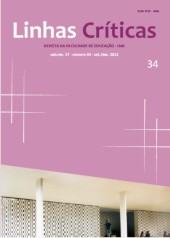Secondary education in Brazil: the challenges faced by the policies to assure and universalize this right
DOI:
https://doi.org/10.26512/lc.v17i34.3827Keywords:
High school education, Education policies, Basic educationAbstract
This paper aims at addressing the challenges of secondary education. It presents political and economic aspects relative to the democratization of secondary education, including data on the coverage of Brazilian schools. It also debates the social function of secondary school, in view of educational policies currently implemented. Finally, it concludes that legal advances and the implementation of educational programs aimed at the expansion of secondary education have generated poor results, suggesting that the universalization of secondary education will remain a long-term challenge to overcome.
Downloads
References
BARBOSA, Luiz; SOUZA, José. Política e economia no governo Lula. Rio de Janeiro: Contraponto, 2010.
BECK, Ulrich. La sociedad del riesgo: hacia una nueva modernidad. Barcelona: Paidós Surcos, 2003.
BRASIL. INSTITUTO BRASILEIRO DE GEOGRAFIA E ESTATÃSTICA (IBGE). Pesquisa Nacional por Amostra de Domicílios 2009. Brasília: IBGE, 2009.
BRASIL. MINISTÉRIO DA EDUCAÇÃO (MEC). Portaria nº 971, de 09 de outubro de 2009. Diário Oficial da União, Brasília, 13 out. 2009. Seção 1, p. 52.
BRASIL, Conselho Nacional de Educação. Resolução CEB/CNE nº 4 de 13 de julho de 2010. Diário Oficial da União, Brasília, 14 jul. 2010. Seção 1, p. 824.
BRASIL. INSTITUTO NACIONAL DE ESTUDOS E PESQUISAS EDUCACIONAIS ANÃSIO TEIXEIRA (INEP).Censo Escolar 2010. Brasília: INEP, 2010.
CURY, Carlos Roberto Jamil. A educação básica no Brasil. Educação & Sociedade, Campinas, v. 23, n.80, set. 2002.
BRASIL. Lei nº 12.061, de 27 de outubro de 2009, que alterou o inciso II do art. 4º e o inciso VI do art.10 da Lei nº 9.394/96, para assegurar o acesso de todos os interessados ao ensino médio público.Diário Oficial da União, Brasília, 28 out. 2009. Seção 1, p. 1.
FERREIRA, Eliza Bartolozzi. A educação profissional nos PPAs dos governos FHC e Lula. Educação & Realidade, Porto Alegre, v. 35, n. 1. Porto Alegre: URGS, jan/abr 2010.
______.; POCHMANN, Marcio. Educação e juventude na sociedade pós-industrial. In: OLIVEIRA, Dalila Andrade e DUARTE, Adriana. Políticas públicas e educação: regulação e conhecimento. Belo Horizonte: Fino Traço, 2011. p. 239-260.
______.; OLIVEIRA, Dalila Andrade (Org.). Crise da escola e políticas educativas. Belo Horizonte: Autêntica, 2009.
FILGUEIRAS, Luiz; GONÇALVES, Reinaldo. A economia política do governo Lula. Rio de Janeiro: Contraponto, 2007.
INSTITUTO DE PESQUISA ECONÔMICA APLICADA (IPEA). Comunicado nº 89: emprego e oferta demão de obra qualificada no Brasil: projeções para 2011.Brasília: IPEA, 2011. Disponível em: <http://www.ipea.gov.br/portal/images/stories/PDFs/comunicado/110428_comunicadoipea89.pdf>.Acesso em: 04 dez. 2011.
INSTITUTO DE PESQUISA ECONÔMICA APLICADA (IPEA). Políticas Sociais: acompanhamento e análise: Vinte Anos da Constituição Federal. Boletins IPEA, Brasília, v. 2, n. 17, 2009.
KUENZER, Acácia. As relações entre trabalho e educação no regime de acumulação flexível: apontamentos para discutir categorias e políticas. In: REUNIÃO ANUAL DA ANPEd, 30., Caxambu,2007. Anais...Caxambu: ANPEd, 2007.
______. O ensino médio no plano nacional de educação 2011”“2020: superando a década perdida?Educação & Sociedade, Campinas, v. 31, n. 112, jul.-set. 2010.
OLIVEIRA, Dalila Andrade. O ensino médio diante da obrigatoriedade ampliada: que lições podemos tirar de experiências observadas?Revista Brasileira de Estudos Pedagógicos, Brasília, v. 91, n. 228,p. 269-290, maio-ago. 2010.
POCHMANN, Marcio. Desenvolvimento e perspectivas novas para o Brasil. São Paulo: Cortez, 2010.
SOUZA, Sandra Zákia Lian; OLIVEIRA, Romualdo Portela de; LOPES, Valéria Virgínia. Ensino médio noturno: democratização e diversidade. Brasília: Ministério da Educação, Secretaria de Educação Básica, 2006. 140 p.
Downloads
Published
How to Cite
Issue
Section
License
Copyright (c) 2016 Linhas Críticas

This work is licensed under a Creative Commons Attribution 4.0 International License.
Authors who publish in this journal agree to the following terms:
-Authors maintains the copyright and grants the journal the right of first publication, the work being simultaneously licensed under the Creative Commons Attribution License which allows the sharing of the work with recognition of the authorship of the work and initial publication in this journal.
- Authors are authorized to enter into additional contracts separately, for non-exclusive distribution of the version of the work published in this journal (eg publish in institutional repository or as a book chapter), with acknowledgment of authorship and initial publication in this journal.
-Authorers are allowed and encouraged to publish and distribute their work online (eg in institutional repositories or on their personal page) at any point before or during the editorial process, as this can generate productive changes as well as increase the impact and the citation of published work (See The Effect of Free Access).



